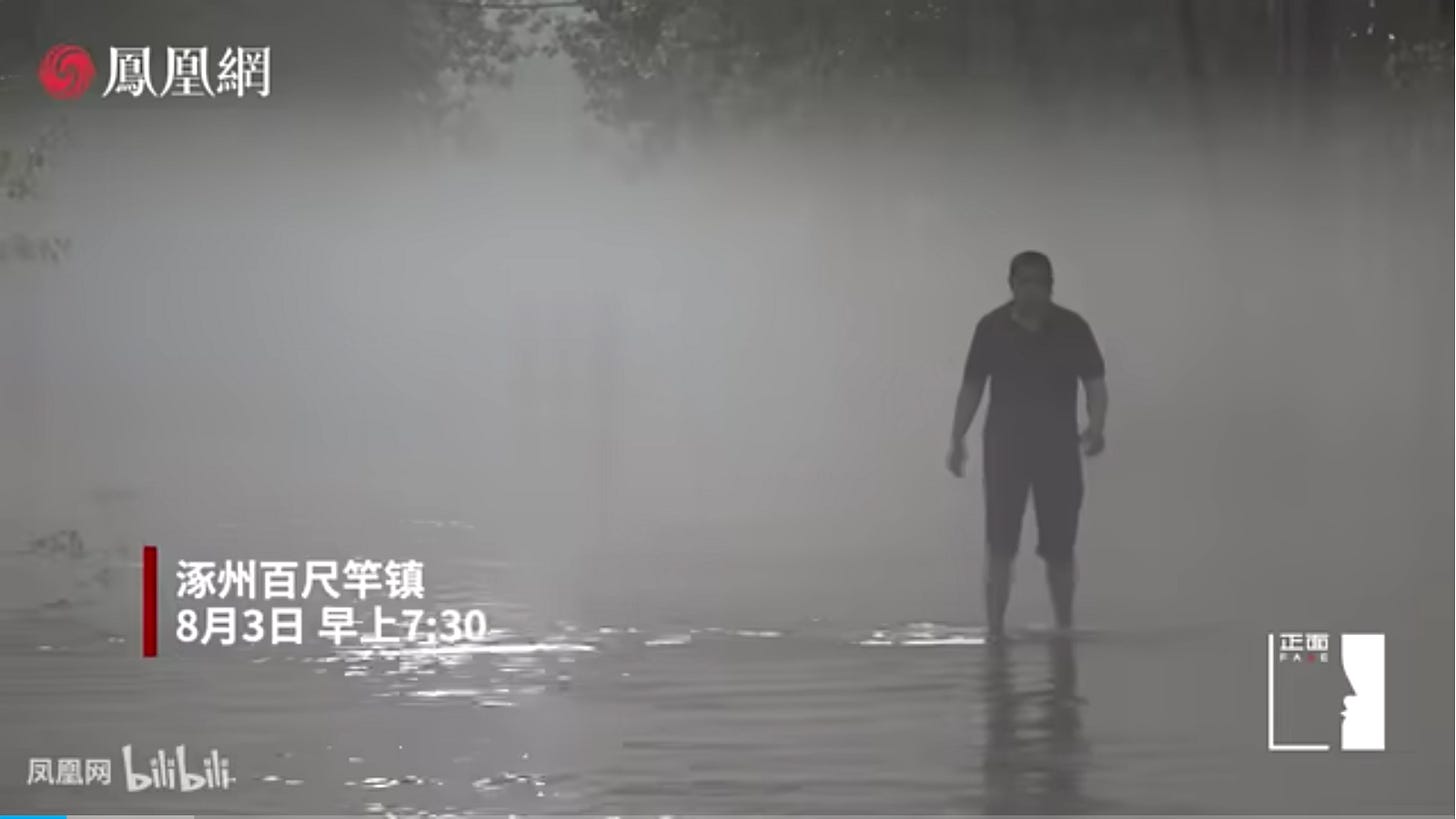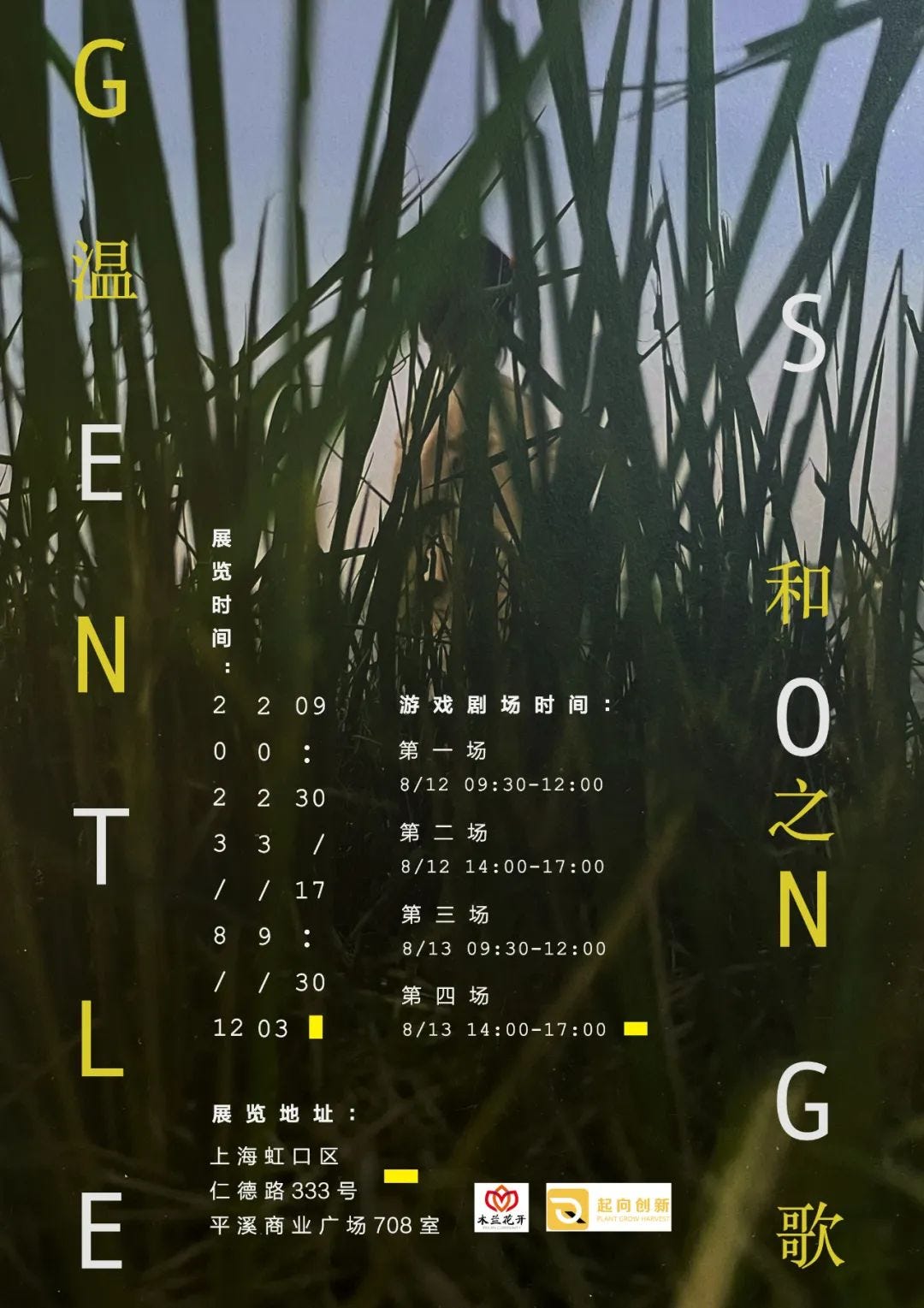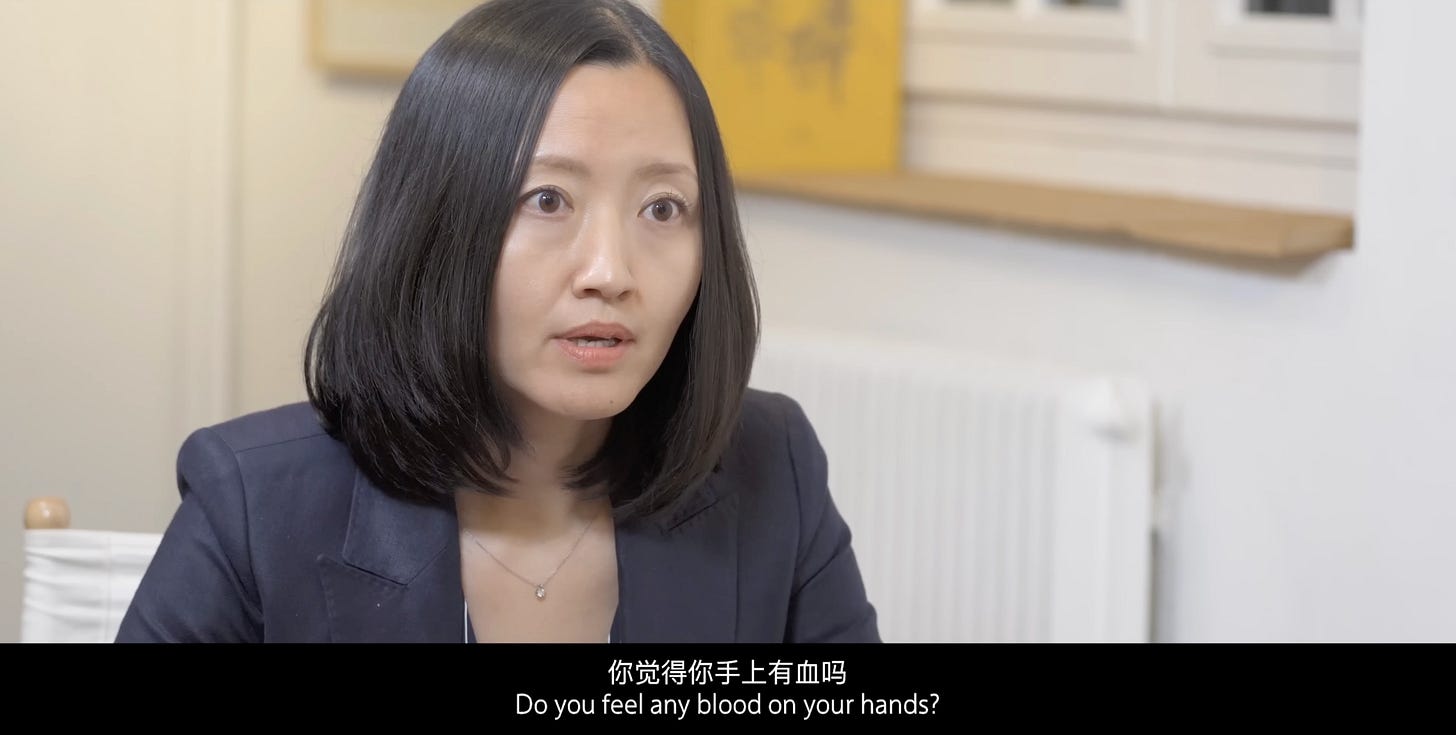#Issue 25: Life in China’s "Flood Storage Areas" + Women Migrant Workers' Art, and More
Hi there,
With multiple global heatwaves this summer, 2023 is on track to be the hottest year on earth. In our last issue, we wrote about the unpredictable rain that devastated much of Henan province’s wheat harvest. This time, we zoom in on another instance of extreme weather, with two videos from the neglected city of Zhuozhou, Hebei province, a designated “flood storage area” that deliberately suffers deluges, in part, to keep the Beijing capital area safe after record-breaking rain.
Next, we present several art projects created by women migrant workers through which they express themselves, build communities, and have their voices heard. Heads up if you’re in Shanghai— “Gentle Song,” an exhibition showcasing photography, documents and objects from some of these projects is showing till September 3. Read on to learn more about the exhibition.
We end this issue with a critique of former CCTV journalist Chai Jing’s new documentary “Stranger: Talking to Jihadists.” This is the first time Chai, director of the 2015 film “Under the Dome”, has worked on a non-China story, but the first episode, which already has 199k views on YouTube, left us hesitant. Read till the end to find out why. If you’ve watched the docu-series, let us know what you think in the comments!
Far & Near is a completely independent and paywall-free newsletter. Currently, only 1.5% of our readers are paying members. With your help, we can continue to produce high-quality stories that celebrate the creativity within China and share remarkable human-centric narratives that often go unnoticed.
Life in China’s "Flood Storage Areas"
The "climate time bomb is ticking," warned U.N. Secretary General Antonio Guterres in March. Recent wildfires in Hawaii were among the worst natural disasters in the U.S. in over a century, leading to the loss of more than 114 lives. Around the same time Maui was burning, the southwestern outskirts of Beijing and Hebei province were dealing with the aftermath of the heaviest rains in 140 years.
But not all of the flooding was natural. As Beijing struggled to face the deluge, Hebei province designated seven “flood storage and diversion areas" to keep the capital area safe. Hebei's Party Secretary Ni Yuefeng even volunteered these areas to be Beijing’s “moat” in a now-deleted statement that received significant public backlash.
One of the cities that bore the brunt of this diversion was Zhuozhou, population 700,000, sandwiched between Beijing and Xiong’an New Area.
According to The Paper, 10 are dead and 18 people missing just in the prefecture of Baoding, which Zhuozhou is part of. Zheng Haipeng, a tireless iFeng video journalist, managed to publish two timely short documentaries about the neglected city. In the first video, we follow the rubber boat of a volunteer rescue team in a mission to evacuate villagers, among them a near-exhausted man wading in chest-deep water, children and elderly people in wheelchairs. In the second video, publishers try to save untainted books in vain as meters-high water washes through storage warehouses, with an estimated 10 billion yuan in economic losses.
Watch Zheng’s two short-docs here and here.
Seeing women migrant workers in theater, games and photography
“Gentle Song”, an exhibition curated by Mulan Community Service Center, a Beijing-based organization founded by and for women migrant workers, is currently showing in Shanghai through September 3.
Featuring photography created by the workers themselves, alongside objects and documents such as factory uniforms and municipal temporary resident permits, the exhibition invites viewers to connect with and learn more about the stories of the women workers. Some of the photography work can be viewed at an online gallery curated by Ofpix, accompanied by the women’s own writing. Going through each post, viewers can feel the strong personal style and character of each photographer, even though some of the photos are just mundane snapshots capturing a glimpse of life like this one below.
As part of the exhibition, viewers are invited to participate in a 2-hour theater game called “The Life of a Mulan.” Based on true stories of women workers, four game designers and theater directors developed an immersive role-playing game where participants delve into the women’s lives, facing the same life choices (or lack thereof) they had to confront. According to Mulan, the theater game has toured five cities in the past two years, reaching many arts and culture spaces and university campuses.

Meanwhile, a recent theater play titled “Multitasking” staged by Beijing-based Hongyan Social Work Service Center depicts the bodily experiences of women domestic workers, from cooking in the kitchen and rocking babies to sleep to surviving domestic violence and finding economic independence in domestic work.
The play, based on true stories, is performed by 17 women who are domestic workers themselves. This video produced by Yitiao shows some behind-the-scenes of rehearsals and features interviews with two women who participated in the theater project. One particularly moving scene in the play shows a domestic worker who has survived domestic violence. All the other actors circle her and repeat the line, “She has no place to call home now.” The circle grows smaller and tighter until it turns into a group hug. Urban domestic workers in China are overwhelmingly women migrants, and their stories - despite their essential role in providing care work in China’s big cities - are rarely seen or heard.
If you're interested in exploring more, we previously wrote about writing as a creative outlet for migrant workers in China. An acclaimed theater play about women migrant workers’ childbirth stories (produced by Mulan Community Service Center a few years ago) is also worth checking out.
We watched the first episode of Chai Jing’s new documentary about terrorism in Europe so you don’t have to.
Some context first. Back in 2015, Chai, a former CCTV reporter, released a self-financed documentary about air pollution in China called “Under the Dome”. The film was an online sensation, racking up over 150 million views before it was censored and scrubbed off the Chinese web. Her celebrated career as an investigative journalist was abruptly halted, and Chai seemed to recede from public-facing work.
Eight years later, she’s back with a 6-part documentary series, “Stranger: Talking to Jihadists”, about terrorism in Europe. The trailer to the series was removed from WeChat within hours after premiering on August 13, but not before it went viral. With anticipation high, the documentary then premiered on YouTube, in which Chai revealed for the first time that she didn’t simply disappear after Under the Dome. Instead, she quit journalism and moved to Spain in 2017, where she and her family had their first direct encounters with terrorism. In the first episode, Chai describes in great detail how her family escaped the 2017 Barcelona attacks by a hair's breadth, and her sense of shock by how deep-rooted terrorism seemed to be in Europe, a continent “wounded in its soft underbelly” (“欧洲像是柔软的腹部受创” - we are appalled by her horrific experience, but have to wonder if she’s aware that this is a cringe descriptor both in Chinese and English…And the first episode is not short of them.)
Despite the length of the documentary, Chai fails, so far, to address far-right and xenophobic violence in Europe against migrants and refugees from the Middle East and Africa. Context about how attacks by white extremists are growing globally has yet to make it into the story. While a famous reporter’s personal experience can be a powerful tool to drive audience compassion and engagement, drawing too much from individual experience undercuts her credibility, especially when Chai’s very goal was to educate a mainland Chinese audience about the “root causes” of Islamic terrorism, a complicated topic her individual experience cannot encompass. If anything, Islamic terrorism has been used to justify “anti terrorism” policies in Xinjiang since 2014.
The tone of the series is reminiscent of CCTV investigations that she led over a decade ago at her peak - sympathetic yet melodramatic. Chai is visibly trying hard to come back. She set up her first Twitter (X) account to promote the series, only to admit in a reply that she’s “clumsy” with the rules of social media platforms. We will continue to monitor the rest of the series in the hope that she proves us wrong, but it’s sad to come to terms with the fact that Chai, a journalism hero that inspired a generation of reporters, might have fallen out of touch.
Who we are:
Yan Cong is a Amsterdam-based photojournalist-turned-researcher interested in digital activism and data centers.
Beimeng Fu is a video journalist based in Shanghai. She is a lover of languages and documentaries.
Ye Charlotte Ming is a journalist and visual editor covering stories about culture, history, and identity. She’s based in Berlin.
Writers: Beimeng Fu, Yan Cong. Copy editor: Krish Raghav
If you like this post, please share it with others and consider becoming a paying member.





